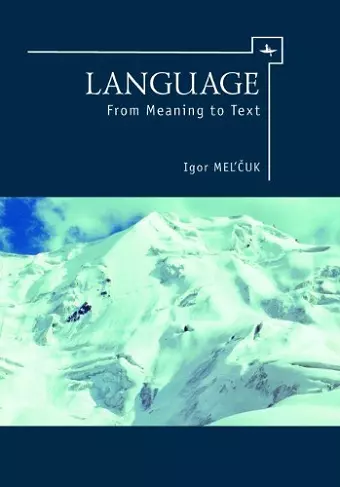Language
From Meaning to Text
Igor Mel'uk author David Beck editor
Format:Paperback
Publisher:Academic Studies Press
Published:30th Jul '20
Currently unavailable, and unfortunately no date known when it will be back
This paperback is available in another edition too:
- Hardback£91.99(9781618114563)

This volume presents a sketch of the Meaning-Text linguistic approach, richly illustrated by examples borrowed mainly, but not exclusively, from English. Chapter 1 expounds the basic idea that underlies this approach-that a natural language must be described as a correspondence between linguistic meanings and linguistic texts-and explains the organization of the book. Chapter 2 introduces the notion of linguistic functional model, the three postulates of the Meaning-Text approach (a language is a particular meaning-text correspondence, a language must be described by a functional model and linguistic utterances must be treated at the level of the sentence and that of the word) and the perspective "from meaning to text" for linguistic descriptions. Chapter 3 contains a characterization of a particular Meaning-Text model: formal linguistic representations on the semantic, the syntactic and the morphological levels and the modules of a linguistic model that link these representations. Chapter 4 covers two central problems of the Meaning-Text approach: semantic decomposition and restricted lexical cooccurrence (≈ lexical functions); particular attention is paid to the correlation between semantic components in the definition of a lexical unit and the values of its lexical functions. Chapter 5 discusses five select issues: 1) the orientation of a linguistic description must be from meaning to text (using as data Spanish semivowels and Russian binominative constructions); 2) a system of notions and terms for linguistics (linguistic sign and the operation of linguistic union; notion of word; case, voice, and ergative construction); 3) formal description of meaning (strict semantic decomposition, standardization of semantemes, the adequacy of decomposition, the maximal block principle); 4) the Explanatory Combinatorial Dictionary (with a sample of complete lexical entries for Russian vocables); 5) dependencies in language, in particular—syntactic dependencies (the criteria for establishing a set of surface-syntactic relations for a language are formulated). Three appendices follow: a phonetic table, an inventory of surface-syntactic relations for English and an overview of all possible combinations of the three types of dependency (semantic, syntactic, and morphological). The book is supplied with a detailed index of notions and terms, which includes a linguistic glossary.
This book should be required reading for every linguist, and if you 'merely' teach a language, you should read it, too. It presents an extraordinary model of how language works, and if you don't know how language works, how on earth can you be a language teacher?" "Igor Mel'čuk, the former wunderkind of Soviet linguistics, has been working on the formal description of sentence structure for decades, bringing his Meaning-Text model to still greater perfection. As a result, this monograph offers an impressive multi-layered grammar encompassing separate semantic, syntactic, morphological and phonological representations of any sentence to be examined, together with an integrated dictionary that is still unsurpassed in its systematic, all-embracing account of semantic, combinatorial and other properties of vocabulary items. The entire apparatus is based on rigorous formal definitions of all concepts involved. Moreover, unlike in comparable studies, all rules and properties are illustrated by a wealth of diverse typological data. All in all, the present monograph represents the best traditions of mathematical linguistics and may be considered a masterpiece of theoretical precision and methodological rigor, buttressed by a rich empirical underpinning." "With Language: From Meaning to Text, Igor Mel'čuk offers a healthy concentration of text linguistics that covers core aspects of the study of natural languages, such as linguistic dependencies, semantics-syntax interface, lexical functions for paradigmatic and syntagmatic lexical relations, and the structure of explanatory combinatorial dictionaries. Theoretical considerations are systematically put to the test with a description of linguistic phenomena from a variety of typologically distinct languages. This gem of a book is the perfect entry into text linguistics for the curious mind who expects linguistic theories not to raise problems so much as to provide solutions.
ISBN: 9781618117694
Dimensions: unknown
Weight: unknown
270 pages